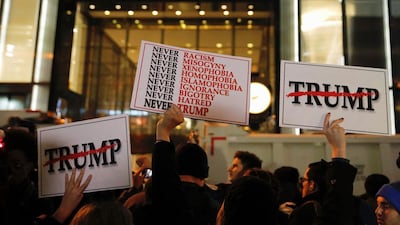Last year was, for sure, a year of tumult and political upsets. Britons voted to leave the European Union and Donald Trump won the US presidential election – results that stunned nearly all the pundits (although keen readers of The National may remember that I wrote a column in February titled Why Hillary won't win the race to the White House).
To some, however, it was far worse than that. 2016: Worst. Year. Ever?" asked The New York Times, while The Wall Street Journal bade "good riddance to a crummy 2016" which had apparently caused "widespread bitterness". How could it have been quite that bad? According to the theorist Kenan Malik, British supporters of the EU "suddenly found themselves, as they see it, in a nation full of xenophobes, bigots and ignoramuses".
America, wrote the economist Paul Krugman this week, “is rapidly turning into a stan” – a reference to the Central Asian republics he describes as “ruled by strongmen who surround themselves with tiny cliques of wealthy crony capitalists”. Mr Krugman warned: “We’re entering an era of epic corruption and contempt for the rule of law, with no restraint whatsoever.”
In the face of such wild overreactions, two things will be necessary in a year during which we are sure to witness plenty of other “shocking” events, such as Marine Le Pen reaching the second round of France’s presidential elections: perspective and respect for democracy.
With a proper sense of perspective, it is clear that none of these events – Brexit, Mr Trump, the election of Rodrigo Duterte in The Philippines and the rise of populists in many countries – have been disasters. Disturbing to many, clearly, but not cataclysmic by any means.
Given that it led to the invasion of Iraq, one could say that the election of George W Bush was a disaster. If, as has been recently alleged, evidence has been found that proves president Richard Nixon interfered with the peace negotiations that could have ended the Vietnam War under Lyndon Johnson, that was not just a disaster but a crime.
And three events of a century ago – the Russian Revolution, the end of US isolationism with its entry into the First World War and the issuance of the Balfour Declaration – were far more world-shaking than anything that happened last year. They truly had consequences of an order that could lead to them being described as disastrous, should one view them negatively.
But today, questions are being asked as to whether democracy itself is in trouble. Could we be entering an era of "democratic deconsolidation", as an essay in the January issue of the Journal of Democracy suggests? The trend "across most liberal democracies is a very serious warning sign", write the authors, Roberto Foa and Yascha Mounk.
But there has been nothing undemocratic about the elections of last year. No one seriously challenges the validity of the results in Britain, America, the Philippines, or indeed Austria, where a far-right candidate came close to winning the presidency.
As I wrote in these pages after the election of Mr Duterte: “We hear dire warnings of democracy being ‘in danger’. It is nothing of the sort. The liberal pro-market dominance of so many democracies may indeed be in danger; but that is another thing entirely.”
Too often the terms “democracy” and “liberal democracy” are used indistinguishably, as they are in the essay mentioned above. Mr Trump’s election, say the authors, gives “renewed urgency to questions about the stability of supposedly consolidated liberal democracies”. Is it a “warning sign that democracy may begin to founder”?
Of course not. In the United States, as in many other countries, it is a globalised liberal economic and cultural system that has foundered. Democracy itself – the process of expressing the will of the people, with an inexorable and inevitable leaning towards majoritarianism which no constitution or legislative hurdle can block for ever – is in perfectly fine fettle.
The bitter rage that has emanated from liberal elites has been an education in what many proponents of liberal democracy really think about democracy. It has been hard not to conclude that liberal “tolerance” only extends to what liberals deem acceptable and that the people’s vote is only to be respected if it produces a result that falls within certain bounds.
Of course, that should not come as a surprise. Britain and America have a long history of intervening to topple leaders they didn’t like, from Chile’s Salvador Allende to Iran’s Mohammad Mosaddegh. They were overthrown in coups backed by the US in both cases, and by Britain in the second. The fact that these leaders were democratically elected was evidently no obstacle to their removal – even in an era when the West was trumpeting democracy and freedom in contrast to the repression under communist rule.
The difference this time is that democracy has not just produced the “wrong” result in the Philippines, India, Russia, Turkey, Hungary and Poland, but also on the West’s ultimate home turf – the US and Britain. Hence the outrage, the necessity of providing “safe places” for quivering snowflakes and the cries of “I don’t recognise my country any more”.
To those, I would say: perhaps you never really knew it, nor did a silent majority of your countrymen, in the first place.
Last year shone a light on those who had been ignored. Far from being a catastrophe, 2016 could be celebrated as a year of democracy – a year the people finally had their say.
Sholto Byrnes is a senior fellow at the Institute of Strategic and International Studies, Malaysia


